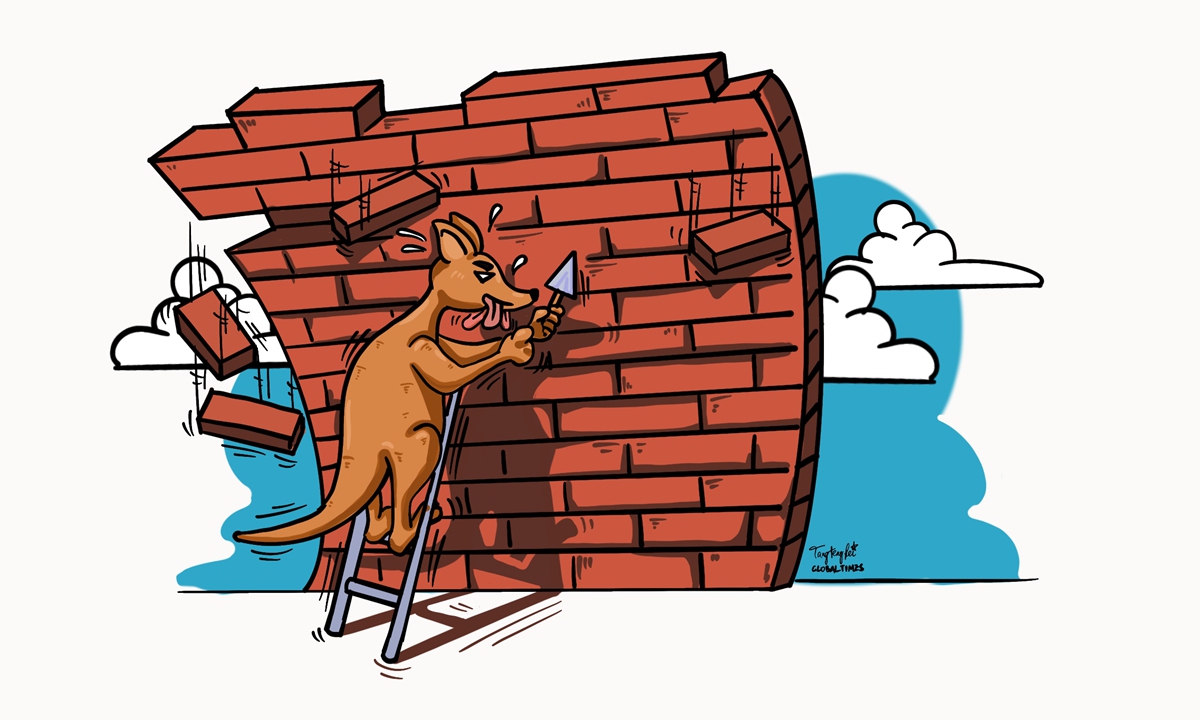Businesses' grievances should arouse reflection in Australia
By Liu Qing Source: Global Times Published: 2020/9/10 19:58:55

Illustration: Tang Tengfei/GT
Raiding Chinese journalists' homes, cancelling academics' visas … the political paranoia about "Chinese influence" is pushing Canberra into hysteria. While Aussie politicians seem determined to indulge their anti-China mindset to escalate tensions, its business community is voicing a louder opposition.
In an opinion article titled "Memo to generals: China is our inescapable economic destiny" this week, the Sydney Morning Herald has raised a long overdue question: people who care about Australia's economic future are wondering what game the country's defense and foreign affairs experts think they're playing.
Citing a recent paper by Dr John Edwards, former Reserve Bank board member of Australia, the article pointed out that the Aussie government should have a clear understanding of Australia's interests, and competent people need to execute policies consistent with that understanding.
However, such understanding has been clearly missed by the Morrison government for a while. Australia's politicians and business circles had reached the consensus in the past that one of the country's priorities should be to maintain the export momentum to the world's fastest growing economy -- China. Thanks to such a policy orientation, the country's economy hasn't seen a recession since 1991.
Canberra has been generally managing the balance well between trade ties with China and its defense alliance with the US, until the Morrison government went too far in fawning to the US' decoupling gambit. As the Morrison government has reportedly changed its opinion on relationship with China and decided to care less about trade, it seems to have forgotten that it's Australia's national interest that is being seriously hurt.
Australia's exports to China slumped by nearly a quarter in August. Australia's trade surplus almost halved in July, plunging a staggering 43.8 percent from June's highs as exports fell sharply, led by iron ore. And the worrying loss of Australia's exports seems just a beginning amid its latest barbaric acts against Chinese journalists.
In addition to trade, the Morrison government's recent unreasonable harassment and oppression of Chinese nationals in Australia, who strictly abide by local laws and regulations, will undoubtedly backfire in its domestic industries including real estate, tourism and education.
Given the fact that Chinese immigration has been a strong contributor to Australian GDP, and that China is Australia's largest trading partner, the soured relationship is set to darken the prospects of Australia's virus-hit economy.
According to a report by Bloomberg on Tuesday, the tensions with China are likely to reduce half of Australia's benchmark stock index. The risks of declining demand for Australian products may hit companies across almost all industrial lines, including wine, milk, food, mining and energy.
Faced with export losses, many people in the Australian business community have been choosing to silently pay for the wrong words and deeds of those anti-China politicians in Canberra. In the current extreme political environment in Australia, business people generally choose not to speak out in order not to cause trouble, because they will be labeled as "under China's influence".
However, facing the current dangerous trend, some of them have chosen to stand up and call on the Aussie government to return to rationality. According to a report of the Financial Review on Wednesday, Australian export giants slammed the Morrison government's handling of the China relationship.
It is conceivable that in the current distorted political environment in Australia, when anti-China stance is becoming political correctness, these business people chose to stand up because on the one hand the situation is miserable, and on the other hand, they really hope that their government can return to reason. These rational voices deserve more attention and need to arouse reflection in Australia.
The author is the director of the department for Asia-Pacific security and cooperation at the China Institute of International Studies. bizopinion@globaltimes.com.cn
Posted in: EXPERT ASSESSMENT,OTHER REGIONS